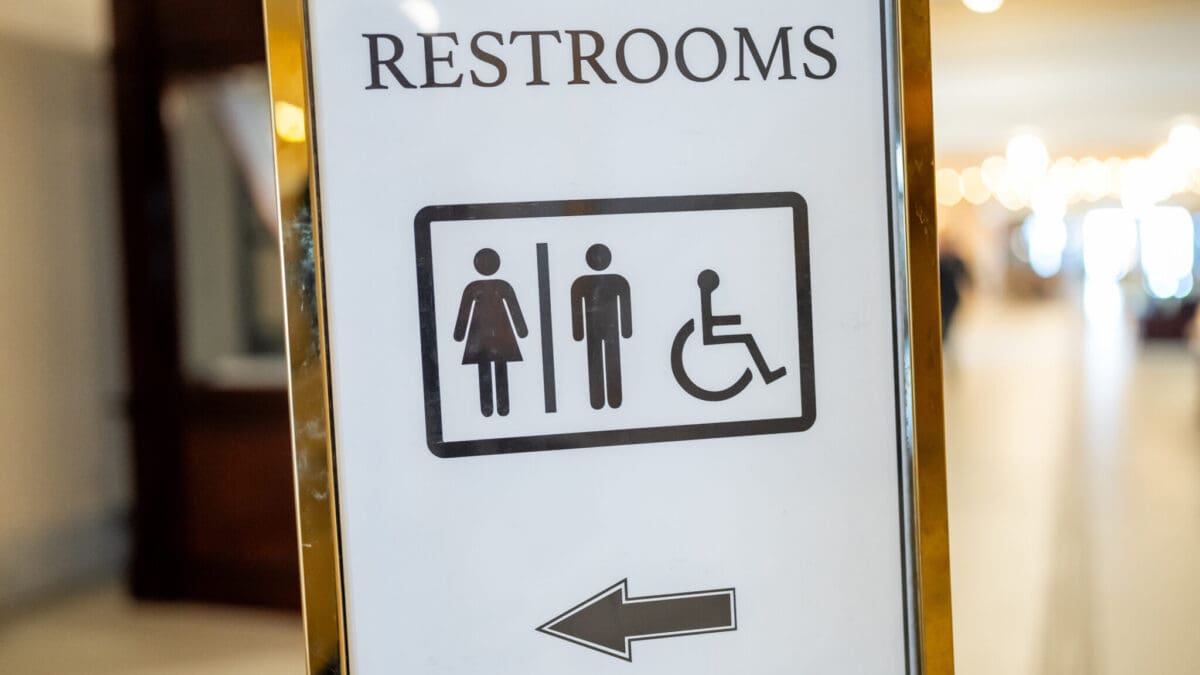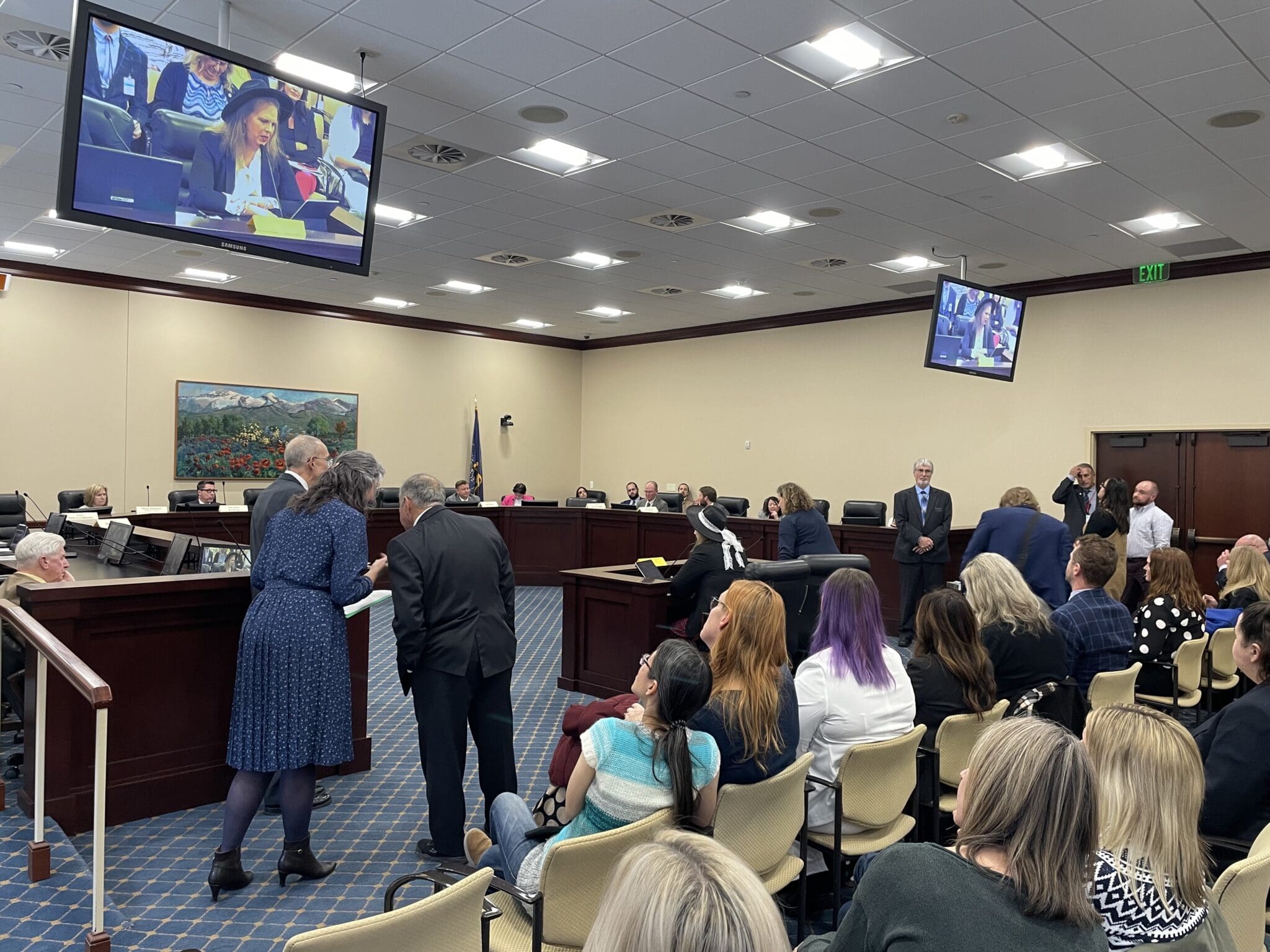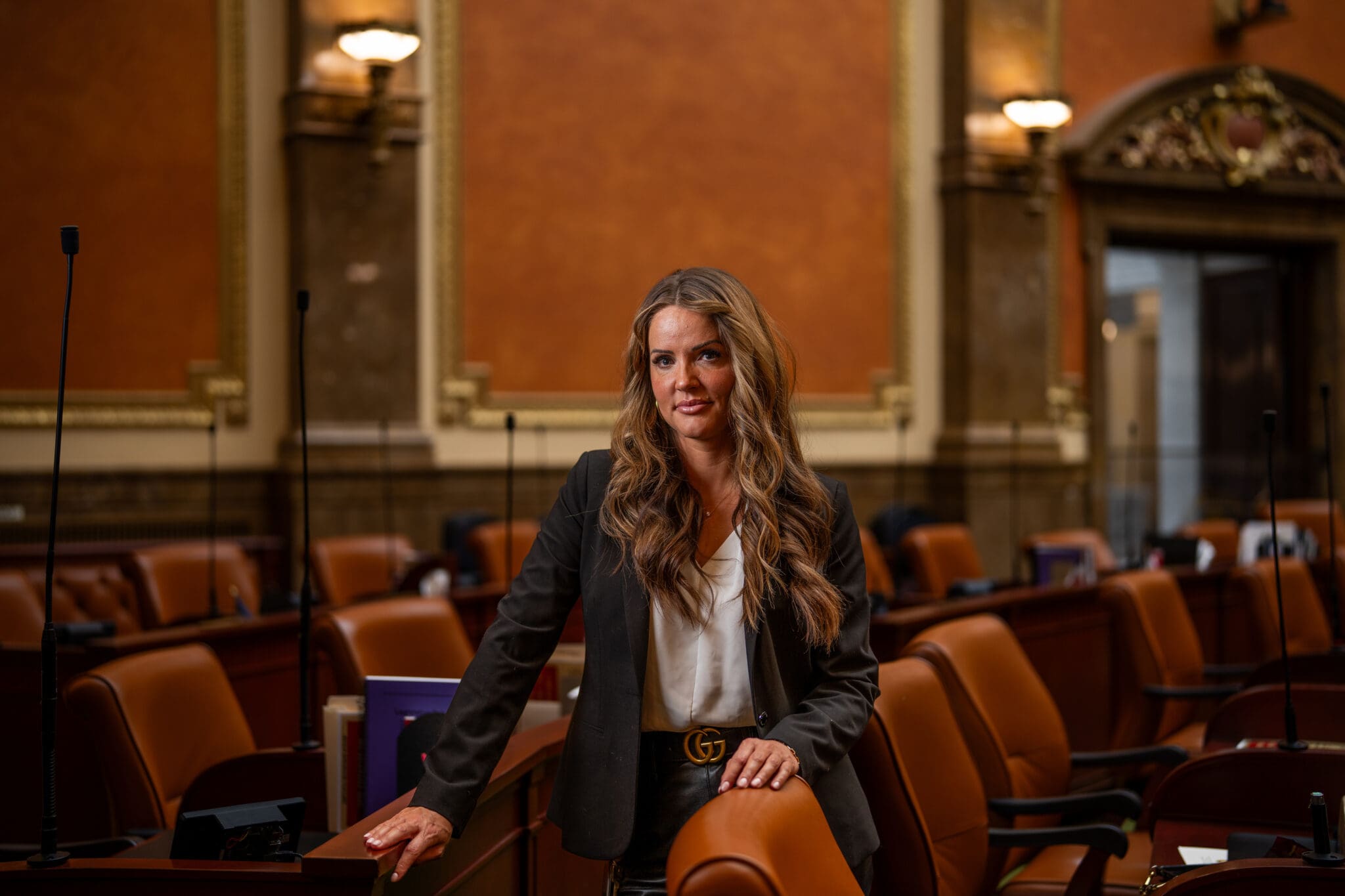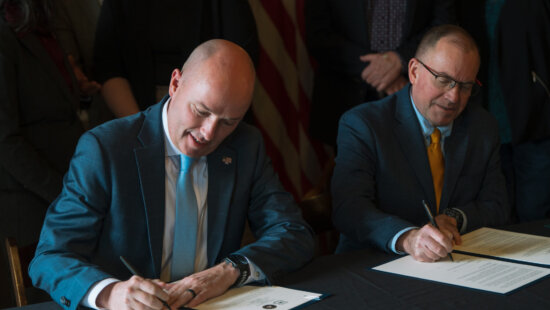News
‘Where does it end?’ Utahns pack hearing on bill to restrict transgender bathroom access

A sign points to bathrooms at the Capitol in Salt Lake City. Photo: Spenser Heaps for Utah News Dispatch
Despite calls to outlaw ‘creepy’ behavior rather than target transgender people, bill heads to Utah Senate
By: Katie McKellar, Utah News Dispatch
January 22, 2024
A bill to restrict transgender access from bathrooms and other facilities in publicly-owned buildings cleared its third legislative hurdle on Monday, advancing it to the full Utah Senate.
The Senate Business and Labor Standing Committee voted 5-3 to pass HB257, a broad bill that also includes requirements to expand unisex or single-stall facilities. The vote came after the bill’s second public hearing, in which over 40 Utahns, including several transgender individuals, urged lawmakers to stop the bill in its tracks, while nine speakers encouraged them to support it.
The vote
One Republican, Sen. Todd Weiler, R-Woods Cross, joined two Democrats who voted against the bill. Even though he said he liked how it defines male and female and the provisions to expand single-stall and gender neutral facilities, he took issue with several provisions, including requirements that could jeopardize federal funding for domestic violence shelters and potential constitutional issues.
While Weiler said he shares concerns about “men with penises in women’s locker rooms,” he said he’s “not convinced this particular draft of the bill … is the right approach.” He added he’s concerned the bill “will force biological women who identify as male with beards and who have been taking testosterone for years, to use women’s restrooms.”
“We all know what’s going to happen. People are going to call the police, they’re going to be questioned,” Weiler said. “In that sense, this bill may create more problems than it solves.”
Sen. Nate Blouin, D-Salt Lake City, and Sen. Karen Kwan, D-West Valley, also opposed the bill, citing concerns about targeting transgender people. Blouin noted it’s the third year in a row Utah lawmakers have advanced legislation singling out the transgender community.
“Where does it end?” Blouin questioned.
The bill’s sponsor, Rep. Kera Birkeland, R-Morgan, urged lawmakers to support her bill not as the perfect solution, but as one trying to help women and girls feel comfortable again in their bathrooms and locker rooms.
“It is very difficult as a woman to constantly be told that my feelings, my daughter’s feelings … all the women that I know, that their feelings don’t matter as much because it hurts somebody else’s feelings,” Birkeland said. “Whether we’re transgender, whether we’re cisgender, whether we’re man, woman, whatever. We should all want to respect safety and privacy, most particularly for women.”
The bill is expected to be heard on the Senate floor later this week. If it clears both votes in the Senate, its final hurdle will be Republican Gov. Spencer Cox’s desk.
The debate
Utah’s Republican-controlled supermajority and its legislative leaders have propelled HB257 along a swift path toward passage. It won a mostly party-line vote from the full Utah House on Friday, with Republican lawmakers lauding it as a “nuanced” bill to address what they’ve described as “privacy” concerns, citing anecdotes of women and girls feeling uncomfortable and unsafe when encountering “men” in women’s locker rooms and restrooms.

The bill’s detractors have decried it as legislation that will restrict transgender rights, segregate them from society’s public spaces, force them to use facilities they don’t feel safe or comfortable in while painting them in a criminal brush.
“I don’t want to be lost in the false narrative that this bill supports,” said Jace Rollins, a transgender man who spoke against the bill.
Birkeland’s bill is not a hard-line ban, but it still imposes more restrictions on transgender people wanting to access facilities that match their gender identities. It does, however, allow transgender people who have “undergone a primary sex characteristics surgical procedure” and have legally changed their birth certificate to access their corresponding facilities.
Brenna Moncur, who identified as a transgender person, said: “I don’t pass as a woman, but I’ve had surgery, I’ve had my birth certificate (changed). I would still be going into the women’s restroom.”
“If you’re trying to protect the world from people like me, this bill doesn’t do it,” Moncur said. “But I also think you don’t need to protect the world from people like us. We are just people. We are just trying to live our lives.”
Birkeland has said her bill would not require a “genital check” and only allow voyeurism or criminal trespass penalties to be brought against a person if a situation causes “affront or alarm.” Critics have raised concerns about how the law will be interpreted and said it leaves too many questions unanswered for the transgender individuals it impacts.
Birkeland has not produced any police reports documenting purported incidents of people entering bathrooms and causing alarm that have happened in Utah, but she has said her bill is more aimed at closing a potential “loophole” that she has said actual “predators” can use.
“Nobody I know cares if a transgender woman comes into their bathroom, uses it for its intended purpose and walks out. That is not what this bill is about,” Birkeland said. “What this bill is about is when a man walks into a bathroom … and just hangs out there, does not use it for its intended purpose. Today, any man in this state can do that. You can walk into a women’s bathroom or a women’s walking room … and if you say you identify as a woman, you can’t and won’t be arrested.”
“So no,” Birkeland said, “there is no police record of these people being arrested, because it’s not illegal for them to just sit there.”
Why transgender restrictions rather than outlawing ‘creepy’ behavior?
Based on Birkeland’s comments, Blouin said it seems her bill is meant to tackle “more of a creepy men in bathrooms issue,” and he questioned why not look to address privacy concerns as a “loitering issue” rather than “impugn” transgender people.
Birkeland argued “sometimes it’s not loitering,” and it’s people pretending to be somebody they’re not.
“Sometimes it is a 17-year-old boy who later comes forward and says, ‘Hi, I wasn’t really transgender,’ but he thought he could get away with it,” Birkeland said, describing a situation in an unnamed school district that left a girl feeling uncomfortable. “He didn’t loiter, he just went in there and said, ‘I’m feeling transgender today,’ which is a horrible thing to do that only harms more people.”
“I don’t want to see the transgender community harmed in any way, believe it or not,” Birkeland said. “But I don’t want to see young girls harmed. So to just stick to loitering really didn’t capture the essence of what a lot of parents and their children are facing right now.”

A Salt Lake County resident, Candace Duncan, again spoke in favor of the bill Monday, saying she experienced discomfort when she twice encountered a “man” in a county recreation center locker room. She brought the issue to Salt Lake County Councilmember Dea Theodore, who proposed a county ordinance to limit transgender access in county locker rooms; it was later tabled for more discussion. Theodore has backed Birkeland’s bill as a better way to more broadly address the issue.
Kristin Richey, of Highland, said women “want protection, legal protection, against men or transgender people being in women’s restrooms or locker rooms.”
“I want protection for myself, my daughters, my granddaughters in private spaces from individuals who are born male,” she said, also calling for more single-occupancy accommodations. “Please don’t let Utah be governed by the 1%. The 99% of people deserve their rights and liberties as well.”
Birkeland has argued that her bill isn’t meant to “target” transgender individuals, pointing to other measures in her bill that would codify measures based on Title IX, a 1972 federal law banning gender discrimination in school programs such as sports, meant to ensure “fair and equal access” to sports facilities and equipment for both men and women — something Birkeland argues Utah women and girls still haven’t received despite Title IX.
Groups including Equality Utah, the state’s largest LGBTQ+ advocacy group, and the American Civil Liberties Union of Utah continue to oppose the legislation. Marina Lowe, policy director for Equality Utah, said they support provisions to increase gender neutral spaces and codification of Title IX, and if the bill “just stopped there,” Equality Utah would support it.
“But unfortunately, we’re concerned about the remainder of the bill,” Lowe said, “which we believe will translate into a cloud of fear that hangs over the heads of transgender Utahns and frankly any Utahns whose gender may not be exclusively clear every time they use a public restroom or locker room.”
“Fear,” Lowe continued, “that at the very least they may have an uncomfortable confrontation and at the very worst criminal consequences.”



















